

Special Rapporteur on Terrorism. Special Rapporteur on the promotion and protection of human rights and fundamental freedoms while counter-terrorism, Ms.
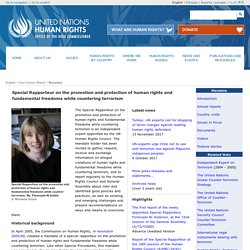
Fionnuala Ní Aoláin© Minnesota Picture The Special Rapporteur on the promotion and protection of human rights and fundamental freedoms while countering terrorism is an independent expert appointed by the UN Human Rights Council. The mandate holder has been invited to gather, request, receive and exchange information on alleged violations of human rights and fundamental freedoms while countering terrorism, and to report regularly to the Human Rights Council and General Assembly about inter alia identified good policies and practices, as well as existing and emerging challenges and present recommendations on ways and means to overcome them.
Historical background In April 2005, the Commission on Human Rights, in resolution 2005/80, created a mandate of a special rapporteur on the promotion and protection of human rights and fundamental freedoms while countering terrorism. Martin Scheinin. Martin Scheinin (born 4 November 1954) was the first United Nations Special Rapporteur on human rights and counter-terrorism.[1] He was selected for this position after serving for eight years (1997-2004) as member of the United Nations Human Rights Committee, the independent expert body monitoring states' compliance with the International Covenant on Civil and Political Rights.
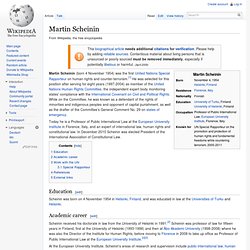
While on the Committee, he was known as a defendant of the rights of minorities and indigenous peoples and opponent of capital punishment, as well as the drafter of the Committee's General Comment No. 29 on states of emergency. Today he is a Professor of Public International Law at the European University Institute in Florence, Italy, and an expert of international law, human rights and constitutional law.
In December 2010 Scheinin was elected President of the International Association of Constitutional Law. Education[edit] Academic career[edit] Work with the UN[edit] Special Rapporteur[edit] References[edit] Counter-Terrorism Committee. Guided by Security Council resolutions 1373 (2001) and 1624 (2005), the CTC works to bolster the ability of United Nations Member States to prevent terrorist acts both within their borders and across regions.
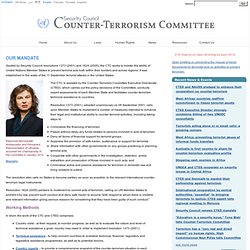
It was established in the wake of the 11 September terrorist attacks in the United States. Raimonda Murmokaitė, Ambassador and Permanent Representative of Lithuania, assumed the chairmanship of the Committee in January 2014. Biography. United Nations Security Council Counter-Terrorism Committee. The Counter-Terrorism Committee is a subsidiary body of the United Nations Security Council.
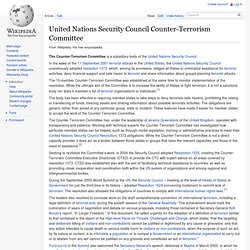
In the wake of the 11 September 2001 terrorist attacks in the United States, the United Nations Security Council unanimously adopted resolution 1373, which, among its provisions, obliges all States to criminalize assistance for terrorist activities, deny financial support and safe haven to terrorist and share information about groups planning terrorist attacks. The 15-member Counter-Terrorism Committee was established at the same time to monitor implementation of the resolution. While the ultimate aim of the Committee is to increase the ability of States to fight terrorism, it is not a sanctions body nor does it maintain a list of terrorist organizations or individuals.[1]
International Counter-Terrorism Legal Instruments. CTED Executive Director's Biographical Note > Mike Smith. Mike Smith assumed the position of Executive Director of the UN Counter-Terrorism Committee Executive Directorate (CTED) on 19 November 2007.
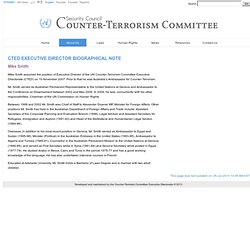
Prior to that he was Australia’s Ambassador for Counter-Terrorism. Mr. Smith served as Australian Permanent Representative to the United Nations at Geneva and Ambassador to the Conference on Disarmament between 2002 and May 2006. In 2004, he was, concurrently with his other responsibilities, Chairman of the UN Commission on Human Rights. Between 1998 and 2002 Mr. Overseas, in addition to his most recent position in Geneva, Mr. Educated at Adelaide University, Mr. 2011-01-presskit-en. UN Counter-Terrorism Committee. Our Mandate The Counter-Terrorism Committee (CTC) was established by Security Council resolution 1373 (2001), which was adopted unanimously on 28 September 2001 in the wake of the 11 September terrorist attacks in the United States.
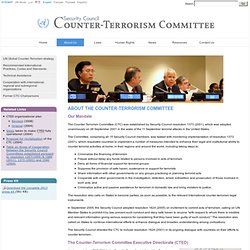
The Committee, comprising all 15 Security Council members, was tasked with monitoring implementation of resolution 1373 (2001), which requested countries to implement a number of measures intended to enhance their legal and institutional ability to counter terrorist activities at home, in their regions and around the world, including taking steps to: The resolution also calls on States to become parties, as soon as possible, to the relevant international counter-terrorism legal instruments.